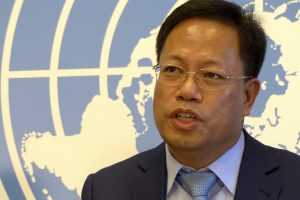On October 6, India abstained on a draft resolution in the United Nations Human Rights Council (UNHRC) on “holding a debate on the situation of human rights in the Xinjiang Uyghur Autonomous Region of China.” The resolution was a follow-up to a recent report by the U.N. Office of the High Commissioner for Human Rights (OHCHR), which cited “serious human rights violations” and possible “crimes against humanity” committed by the Chinese government in Xinjiang.
The vote in the 47-member UNHRC was tight: 17 countries voted in favor and 19 against, with 11 abstaining. The resolution was defeated.
This is the first time that China was the subject of a country-specific resolution at the UNHRC.
Providing an explanation for its abstention, India’s Ministry of External Affairs (MEA) said the following day that the vote was “in line with its long-held position that country-specific resolutions are never helpful.” Instead, MEA spokesperson Arindam Bagchi said, “India favors a dialogue to deal with such issues.”
A former Indian diplomat who spoke to The Diplomat said that India has traditionally abstained on such country-specific resolutions at the UNHRC. The UNHR is more about “fighting geopolitical battles than upholding human rights worldwide,” he said, arguing that “resolutions sponsored by Western countries are often used to pressure developing countries.” Countries that “feel cornered at global forums” are unlikely to address the problem, he said.
While it is true that geopolitics rather than genuine human rights concerns determine the working of the UNHRC, India has not always abstained in the UNHRC on country-specific resolutions. During the recent meeting, India did not abstain on resolutions relating to Afghanistan and Ethiopia. While New Delhi did abstain in the recent vote on Sri Lanka, it voted against Colombo in 2012 and 2013. In fact, at the 2013 meeting, India followed up its vote by calling “for an independent and credible investigation into allegations of human rights violations and loss of civilian lives” during the Sri Lankan civil war.
The Indian government’s decision to abstain on the Xinjiang resolution drew flak at home. Opposition parties mocked Prime Minister Narendra Modi for being “scared of offending” China. Others excoriated the government for its unprincipled policy.
“Far from being principled, it calls into question our motives, is morally reprehensible and hypocritical, and does immense damage to our moral standing as a country,” Deepak Sinha, a visiting fellow at the New Delhi-based Observer Research Foundation wrote.
India’s abstentions at the UNHRC stem from its apprehensions over international censure for its own dismal human rights record in Jammu and Kashmir. New Delhi fears that by voting for discussion of the situation in Xinjiang, it is making itself vulnerable to international scrutiny of Kashmir, which India’s government is keen to avoid at all costs, even if it means letting China off the hook on Xinjiang.
India is particularly cautious with China because of its strained relations with Beijing, especially in the context of the ongoing military standoff along the disputed border. As Minister for External Affairs Subrahmanyam Jaishankar pointed out rather candidly, “I have enough issues with China as it is… I would rather focus on the issues that are already on my plate.”
New Delhi does not want to further roil already troubled relations with its powerful neighbor.
The Indian government has cited strategic autonomy and national interests to justify its repeated abstentions on resolutions at the United Nations on the Russian invasion of Ukraine. In the case of China, however, Indian analysts are doubtful that India’s abstention will further its national interests.
As Jabin T. Jacob, associate professor at the Shiv Nadar University in New Delhi, pointed out, “If even after the blatant Chinese attack on Indian territorial integrity and sovereignty in 2020, New Delhi is unable to take advantage of opportunities to highlight China’s bad behavior, or at least to embarrass it,” then India is undermining its “ability to shape international narratives on that country.” Additionally, New Delhi’s reluctance to call out Beijing “provides wings to China’s ability to promote its own narratives of what happened, and is happening” along the China-India border.
Moreover, China is not reciprocating India’s display of sensitivity to its core concerns.
Beijing has voted to undermine Indian interests in global forums. It has, for instance, repeatedly blocked resolutions in the U.N. Security Council calling for sanctions against Pakistan-based anti-India terrorists. It has done so five times since June this year, including twice after India abstained on the Xinjiang resolution.
India’s timid, even self-defeating policy toward China is bringing it little returns.
Yet there are small signs of change.
Although New Delhi refrained from ruffling China’s feathers over Xinjiang at the UNHRC, a day after its abstention, the MEA said that India has “taken note of the OHCHR Assessment of human rights concerns in the Xinjiang Uyghur Autonomous Region, People’s Republic of China.”
“The human rights of the people of Xinjiang Uyghur Autonomous Region should be respected and guaranteed,” Bagchi said and called on the “relevant party” (read China) to “address the situation objectively and properly.” This is the first time ever that India has called on China to take steps to “address” the human rights situation in Xinjiang.
Is India slowly shedding its inhibitions on speaking up on the situation in Xinjiang? Its recent statement on the Xinjiang situation was at an MEA media briefing in New Delhi. It will be a while before India speaks up on China’s human rights record at global forums.

































